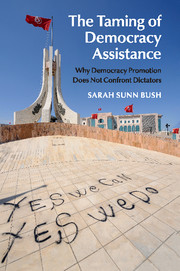Preface
Published online by Cambridge University Press: 05 May 2015
Summary
My interest in democracy assistance began in 2007 when I had the opportunity to travel to Rwanda as part of a policy workshop sponsored by the Woodrow Wilson School of Public and International Affairs at Princeton University. The workshop was on the subject of “Managing Elections in Fragile States” and was led by brilliant elections guru Jeff Fisher of Creative Associates International, Inc. In 2007, Rwanda was preparing for a three-year electoral cycle that would determine whether the country would match its post-genocide strides in terms of good governance with strides in terms of liberal democracy. At the time, there was cautious optimism about the leadership's democratizing intentions. As of 2014, that optimism is gone.
Observing international aid to promote democratization in Rwanda was eye-opening. I remember visiting the country's shiny new National Electoral Commission, which was filled with desks and computers, but hardly any staff members. The electoral institutions were ready to hold technically sound elections, but they were not empowered to ensure that the campaigning environment was genuinely open and competitive. I also became intrigued by the buzzwords on the lips of international donors – observers, gender quotas, early warning systems – and their limits. The Rwandan government was mightily concerned with international legitimacy at the time, depending heavily on foreign aid, but the goals targeted by foreign-assistance programs did not seem to be fundamentally altering the political environment. Why was the international community not seizing the opportunity to push hard for the institutional reforms that might lead to meaningful democratic change, I wondered. More generally, what accounts for the prevalence of technical programs that do not confront dictators in fundamentally undemocratic environments? Why is democracy assistance so often tame?
This book represents the fruits of my efforts to answer those questions over the ensuing years. The argument that I develop in it focuses on the design and implement democracy assistance. In Chapter 1, I develop the puzzle that the book seeks to address in more detail; and then in Chapter 2 I develop my argument.
- Type
- Chapter
- Information
- The Taming of Democracy AssistanceWhy Democracy Promotion Does Not Confront Dictators, pp. ix - xiiPublisher: Cambridge University PressPrint publication year: 2015

